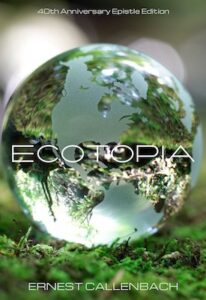Not so very long after the 2016 U.S. presidential election results were announced, more than just a few people in the so-called “blue states” began openly wondering about the possibility of breaking away from the rest of the country and setting up one of their own. It’s not terribly surprising. For a substantial portion of the citizens in such states as Oregon, Washington, and California, much of what the new president-elect had been openly threatening to do for the many embarrassing months of his campaign were so diametrically opposed to what they saw as the right way to live – as individuals, with one another, and with the world around them – that they quickly came to see secession as a viable alternative to enduring a life under the new administration.
However what many of these potential would-be secessionists may not have known is that in 1975, Ernest Callenbach’s novel Ecotopia portrayed in remarkable detail what such a possible successful secession of the “left coast” might look like twenty years following the split. Rejected by over twenty publishers prior to finally seeing print, Ecotopia has developed from an obscure word-of-mouth recommended novel (reviewers initially refused to give it any attention at all) into a genuine classic of modern fiction with over a million copies having been printed. Thus in 2015, Heyday Books brought out this special Ecotopia – 40th Anniversary Epistle Edition
containing the full text of the novel as well as Callenbach’s breath-takingly prescient 2012 essay “Epistle to the Ecotopians.”
The word “breath-taking” here is not used hyperbolically, for in as much as Callenbach included a remarkable variety of forward-thinking technologies, methods of living, and social programs in his Ecotopia that were, at the time he was writing, either wholly unheard of or little more than pipe dreams (video telephones, publicly-funded bicycle sharing programs, separated recycling bins, and organic biodegradable plastics to mention only a few), his “Epistle” so accurately prefigures the dynamics of the 2016 election previously mentioned as to cause the reader quite literally to stare breathless at the page as the words sink into the mind.
Skeptical? Try this brief passage:
As empires decline, their leaders become increasingly incompetent—petulant, ignorant, gifted only with PR skills of posturing and spinning, and prone to the appointment of loyal idiots to important government positions. Comedy thrives; indeed writers are hardly needed to invent outrageous events.
Now remember, Callenbach wrote this sometime prior to 2012.
Of course, before reading the amazing “Epistle,” one should first read the novel itself; not at all a difficult task, even for those who might not normally enjoy fiction. Using a dual narrative, intertwined style of private journal entries and published newspaper articles by the novel’s narrator, William Weston, as he journeys to and explores the then twenty-year-old independent nation of Ecotopia that was formerly substantial parts of Oregon, Washington, and California, Callenbach uses his narrator to describe and elaborate upon the political, economic, technological, and cultural structure that the Ecotopians have created for themselves following their secession from a United States that had become increasingly mired in political and economic stagnation.
For those who already try to live – or wish they could – a life in harmony with the natural world, Ecotopia is a paradise on Earth; however, admittedly, to others whose views might lean more toward somewhat of a “the Earth is here for the good of mankind and to be used how we please” perspective, Callenbach’s new nation would probably be more commonly described as a hippy-dippy hell. Yet to those who might think a more ecologically balanced life would be nice or at least more generally sustainable “if only…” much of what Ecotopia contains in its pages will provide food for thought.
Callenbach was not simply some “pie in the sky” utopian fantasist; he spent three years writing this relatively short novel, attending to many of the small details that could make so many of the aspects of Ecotopia actually possible. From his economic assessments of the natural, technological, and population strengths that would have been found in the region at the time of secession, Callenbach correctly determined that far from not being able to produce enough to feed, clothe, and house, themselves, the Ecotopians would be at risk of over-production. How the such things are dealt with, how the idea of a stable-state society works in practice, and how it shapes the resulting society, is truly a fascinating tale of possibilities not out of the question in our own world.
Additionally, and this will likely come as a surprise to some of those who might be inclined to view such an idea as ecological balance and sustainable living with a somewhat jaundiced eye, Callenbach’s Ecotopians are remarkably self-sufficient, with such skills as hunting, mechanical repair, and other “hard handed” activities being regarded highly in their culture. Indeed, Ecotopia is a fascinating fusion of down-to-Earth practicality and out-on-the-edge progressive, perhaps what might sometimes be termed “alternative lifestyle” practices (let’s just say neither your or my medical insurance covers the level of care that an Ecotopian hospital provides!). However in the end, the sum total comes down to one simple idea: a more sustainable – and in the eyes of Callenbach, as well as my own, better – society is possible.
I sincerely hope that everyone reading this essay will take the time to read this new edition of Ecotopia along with Callenbach’s genuinely hope-filled epistle that accompanies it. For some, it is understood that such a society would not be one in which they could comfortably – or even uncomfortably – live, and that’s OK; it’s part of the reason that the secession of Ecotopia happened in the first place. However for those, like me, who would have ourselves and our families on the next available train out of Reno (you’ll understand once you read it) and into this new nation – if it indeed existed – in search of a better, more ecological, stable-state life, it offers hope that we are not alone in our desire for a more humane, balanced, and sustainable society. Ecotopia contains the one thing so many of us desperately need today: hope that the future could truly be better. The only question is that of what we are willing to do to make it happen.
 Title: Ecotopia – 40th Anniversary Epistle Edition
Title: Ecotopia – 40th Anniversary Epistle Edition
Author: Ernest Callenbach
Publisher: Heyday Books
Format: Paperback
Pages: 192 pp., with a new forward by Malcom Margolin and an afterword and essay by the author
ISBN: 978-1-59714-293-9
